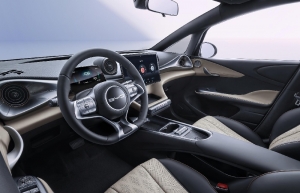Price incentives can electrify transport
Tran Anh Thai, vice general director of Applied Technical Systems JSC, said at a conference hosted by VIR last week on the issue that the number of hybrid and electric cars is on the rise, leading to an increasing demand for electricity at charging stations.
 |
| There were many illuminating discussions at last week’s event on electric vehicles and net-zero goals |
“According to Vietnam’s green transport strategy, more renewable energy is required to provide adequate green electricity for the transition of the transport sector already in the short term, thus increasing the electric vehicle fleet,” Thai said. “With existing policies, the number of electric vehicles is forecast to increase about 12-fold by 2035.”
Thai suggested that the development and exploitation of charging station infrastructure needs to be synchronised with the development of the grid.
In the United States, to encourage consumers to switch to e-vehicles, the electricity price for charging stations is calculated to be lower than the monthly cost that drivers pay for petrol cars. The average electricity price is about 13 US cents per kilowatt hour. Thus, the electricity price for charging stations is much lower than the retail electricity price for households in the US.
At another conference on green transport development challenges two weeks ago, Deputy Minister of Transport Le Anh Tuan said that all countries moving towards net-zero emissions have had a difficult start, and no country can say that it has all the policies and infrastructure in place to achieve net-zero emissions.
“Electrification is a trend that creates momentum towards net-zero emissions, but it is not the only direction, there are many other directions. Vietnam is a country with strengths in agriculture and forestry, we will put the development of transport in the context of the carbon market that will be developed forcefully. Problems related to carbon credit exchange are one of the key points towards net-zero,” Tuan added.
He suggested that Vietnam will have to balance the development of the electricity industry with the development of means of transport, and the planning of the power grid with the development of the charging station system.
“Only when the charging station system is developed can we think about developing electric road vehicles,” he said. “If the power sector is not targeted by a similarly ambitious and short-term focused plan on renewables expansion and integration, then cross-sectoral synergies are not unlocked.”
Slower green development of the power sector combined with a rapid transition to e-fuels and other green fuels leads to a higher cost of reaching the net-zero goal by 2050, noted the Vietnam Energy Outlook Report published in June by the Electricity and Renewable Energy Authority, the Danish Energy Agency, and the Embassy of Denmark.
 | BYD commits to convenient offerings for vehicle owners Greening the automotive industry in Vietnam involves companies like BYD Vietnam, which is making efforts to contribute to the process. Vo Minh Luc, CEO of BYD Vietnam, told VIR’s Hara Nguyen about the company’s plans to deliver the most convenient experience to users. |
 | Pointed pivot can ensure EV success Vietnam’s journey towards electric vehicle adoption and reduced emissions, while challenging, can be achieved through strategic planning, supportive tax policies, and robust infrastructure to meet its green transformation goals. |
What the stars mean:
★ Poor ★ ★ Promising ★★★ Good ★★★★ Very good ★★★★★ Exceptional
 Tag:
Tag:
Related Contents
Latest News
More News
- State corporations poised to drive 2026 growth (February 03, 2026 | 13:58)
- Why high-tech talent will define Vietnam’s growth (February 02, 2026 | 10:47)
- FMCG resilience amid varying storms (February 02, 2026 | 10:00)
- Customs reforms strengthen business confidence, support trade growth (February 01, 2026 | 08:20)
- Vietnam and US to launch sixth trade negotiation round (January 30, 2026 | 15:19)
- Digital publishing emerges as key growth driver in Vietnam (January 30, 2026 | 10:59)
- EVN signs key contract for Tri An hydropower expansion (January 30, 2026 | 10:57)
- Vietnam to lead trade growth in ASEAN (January 29, 2026 | 15:08)
- Carlsberg Vietnam delivers Lunar New Year support in central region (January 28, 2026 | 17:19)
- TikTok penalised $35,000 in Vietnam for consumer protection violations (January 28, 2026 | 17:15)






















 Mobile Version
Mobile Version